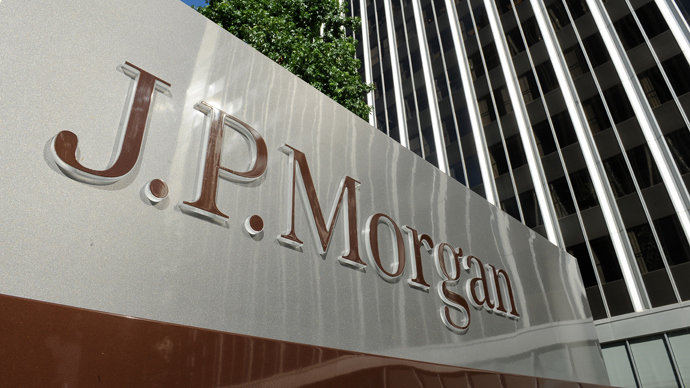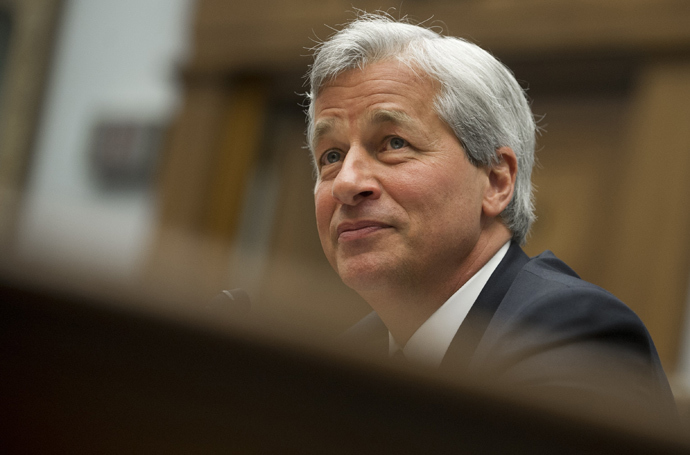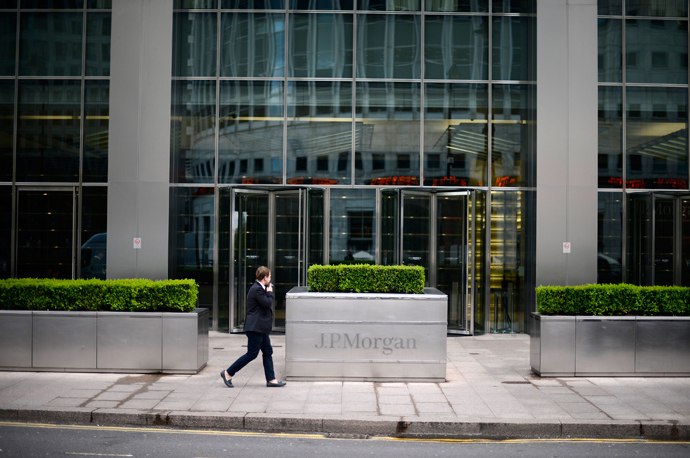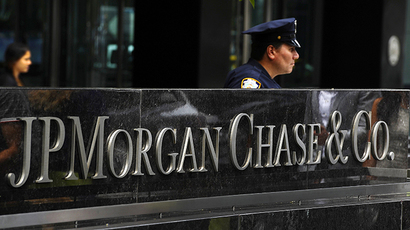'London Whale' Bruno Iksil to avoid charges over JPMorgan $6.2bn loss

Ex-JP Morgan Chase trader Bruno Iksil also known as a “London Whale” has reportedly cut a deal with the US prosecution team, and will avoid charges for covering up huge losses he created by risky derivatives trading, a source close to the matter says.
Iksel, nicknamed “London Whale” for the size of his trading book, is now working with the US federal government to build a case against his former supervisor Martin-Artago, as well as Julien Grout, another trader on the JP Morgan team who tried to conceal $6.2 billion in losses from federal regulators.
Prosecutors may announce charges for Grout and Martin-Artajo on
Wednesday for their roles in masking the real losses of the
bank’s risky derivatives trading, Bloomberg reports.
Unless new evidence is unearthed and other charges are raised
against him, Iksel will likely get off scot-free.
The investigation could lead to a hefty fine for the bank as well
as increased government intervention in banking.
All three London-based traders allegedly covered up losses when
they initially told regulators losses amounted to £8million, when
in reality the sum was closer to £4bn. The scandal later became
known as the ‘London Whale’, coined after the location and the
magnitude of loss.
Grout and Martin-Artajo are both facing charges by the US
Department of Justice for knowingly understating losses. The
Securities Exchange Commission is also looking into the trade
debacle.
"The investigation is focusing on whether anyone responsible
for the trades tried to deliberately mismark them by inflating
the value at which they were recorded on JPMorgan's books at the
height of the scandal, which took place during the first half of
2012,” Reuters reported.
JP Morgan CEO Jamie Dimon, CIO Ina Drew, and Achilles Macris, who
ran the London trading office, and everybody who were part of the
‘London Whale’ have so far not been legally pursued.

In the aftermath of the fiasco, CEO Dimon took a 50 percent pay
decrease in 2012 – slashed to $11.5 million from $23.1
million in 2011.
In June 2012, Dimon testified before a Senate sub-committee,
which was gathered in response to the ‘London Whale’ scandal.
Dimon said his bank was undergoing ‘extensive changes’ in the way
it does business. The JP Morgan CEO acknowledged then that
the bank’s strategy was wrong, and “was poorly reviewed,
executed, and monitored”.
The CEO’s comments came in an attempt to revitalize the
reputation of the bank as ‘safe’.
JPMorgan fired Iksil and Martin-Artajo shortly after the scandal
first surfaced.
Where are the ex-traders?
Grout, a French national, has allegedly returned to his native
country, which could complicate any future US extradition
process.
Edward Little, an attorney at Hughes, Hubbard & Reed in New
York, confirmed his client wasn’t ‘hiding’ in a statement
Tuesday.
"He would have been crazy to have come here if he had been
hiding," said Little, dismissing media reports Grout had fled
to France.
The US Fed and the Scotland Yard are coordinating the arrest
warrant of Martin-Artajo, who is reportedly on holiday, and
hasn’t yet been detained.
Martin-Artajo’s London-based lawyers at Norton Rose Fulbright's
released a statement that their client is on a long-term
vacation, and will return to London, but gave no specific dates.
The laundry list and government intervention
The web of legal entanglements has tarnished its reputation as
the bank that ‘survived’ the recession and was safe from the
evils of Wall Street, whereas other institutions were exposed
early on in the financial crisis.

President Barack Obama, who in 2012 opened an account with
JPMorgan Chase with assets value between
$500,000 and $1 million, called the lender 'one of the
best managed banks there is'.
The US Senate panel in March issued a scathing report that
concluded that JPMorgan Chase had piled on risk, hidden losses,
disregarded risk limits, dodged regulatory oversight and
misinformed the public during the London-based trading episode.
As new allegations and lawsuits pop up, the government has become
increasingly involved in Wall Street affairs.
US Federal Reserve Chair Ben Bernake has been forcefully calling
for the application of the ‘Volcker Rule’, which would protect
individuals from a bank’s speculative risks by splitting a bank’s
investment and retail operations. The Volcker Rule was put forth
following the financial crisis of 2008, to control risk in the
financial sector and minimize conflict of interest between banks
and clients.
The bank’s main regulator, the Office of the Comptroller, has
ordered it to improve its controls within the bank, and probed for internal documents.
The bank continues to respond to multiple criminal and civil
investigations- from the Department of Justice, the National
Credit Union Administration, MF Global, the California Attorney
General, the UK Financial Conduct Authority, the US Securities
and Exchanges Commission, and even Bernie Madoff himself, who
used a JPMorgan bank for one of his Ponzi schemes.
“It is jihad against the largest US banks,” says Tom Brown,
founder of the investment management firm Second Curve Capital
and frequent critic of the industry.














